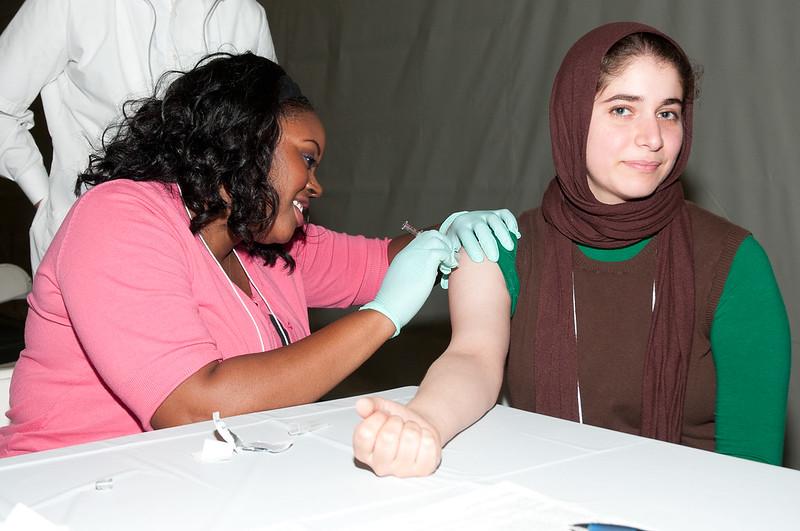A new influenza drug that lasts for an entire flu season may outperform flu vaccines, according to the results of a large phase 2b trial highlighted in a news release by the drug's manufacturer, Cidara Therapeutics of San Diego.
Single doses of 150 milligrams (mg), 300 mg, and 450 mg provided 58%, 61%, and 76% protection from symptomatic flu, respectively, for about 6 months after injection, according to the data, which has been submitted to the Food and Drug Administration (FDA).
The trial involved 5,071 healthy, unvaccinated adults 18 to 64 years old assessed at 57 US sites and 1 UK site. They received a single shot of the experimental small-molecule neuraminidase inhibitor, called CD388, at the beginning of the flu season—from September to December 2024—and were evaluated for clinically confirmed and lab-confirmed influenza for 24 weeks. The results have not yet been published in a peer-reviewed journal.
The researchers found that 2.8% of the placebo group contracted influenza within the study timeframe. But those receiving the drug had lower rates.
Highest dose provided 76% protection
The drug's prevention efficacy (PE) was 76.1% in the 450-mg group, 61.3% in the 300-mg group, and 57.7% in the 150-mg group. All results for the 4,726 participants assessed for the primary end point were statistically significant.
According to US Centers for Disease Control and Prevention data, the effectiveness of flu vaccines in the past 15 flu seasons has ranged from 19% to 60%.
CD388 also met all secondary end points, including efficacy at body temperatures of 37.8°C (100°F) and 37.2°C (99°F) thresholds, as well as statistically significant maintenance of PE for up to 28 weeks.
Safety data were similar across all three dose groups and the placebo group, with no serious adverse events noted. Cidara plans to present additional results from this NAVIGATE trial at scientific conferences this year. It is assessing the data to determine what dose or doses to assess in the next step, a phase 3 clinical trial set to begin next spring.
We are blessed by the fact that any of the three doses would likely be well suited for the phase 3 study.
Jeffrey Stein, PhD, president and CEO of Cidara, said in a press conference on the results, "Traditionally, as you know, in clinical trials you tend to the go with the highest dose so long as there is no safety limitation or tolerability issues. And certainly that's the case that we have here."
"We are blessed by the fact that any of the three doses would likely be well suited for the phase 3 study. But the final dose selection will be dependent on our final analysis of the pharmacokinetics and virology data." Stein added that more detailed results will be available by September.
'Potential breakthrough'
Nicole Davarpanah, MD, JD, Cidara's chief medical officer, said in the news release that the results "mark a potential breakthrough for patients and the future of influenza prevention."
"These Phase 2b results support the potential of CD388 to be a highly effective and well-tolerated seasonal prophylactic for high-risk individuals, such as those with compromised immune systems or those at a heightened risk of severe illness due to underlying health conditions. We look forward to engaging with the FDA and expanding on these results in our planned Phase 3 trial."
"Results such as these are unprecedented in influenza and support our confidence in the potential of CD388 to offer robust, once-per-season protection against influenza A and B," said Stein in the release. "CD388 was designed to provide once per season protection against all strains of influenza in all people, irrespective of immune status."
CD388 was designed to provide once per season protection against all strains of influenza in all people.
During the press conference, Stein said the company has reached out to the Biomedical Advanced Research and Development Authority (BARDA) for potential support for the drug but has not yet met with BARDA officials to go over the data in detail.




















